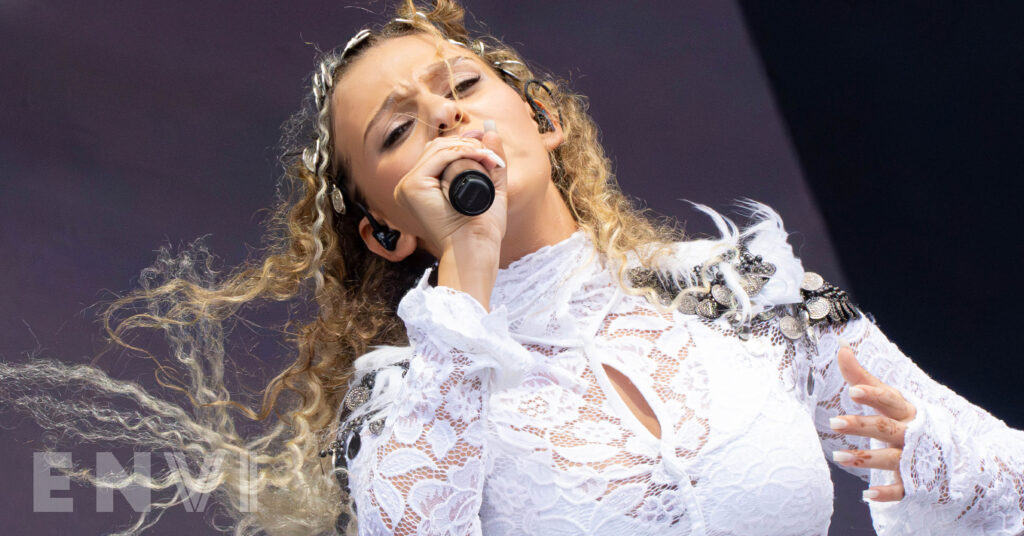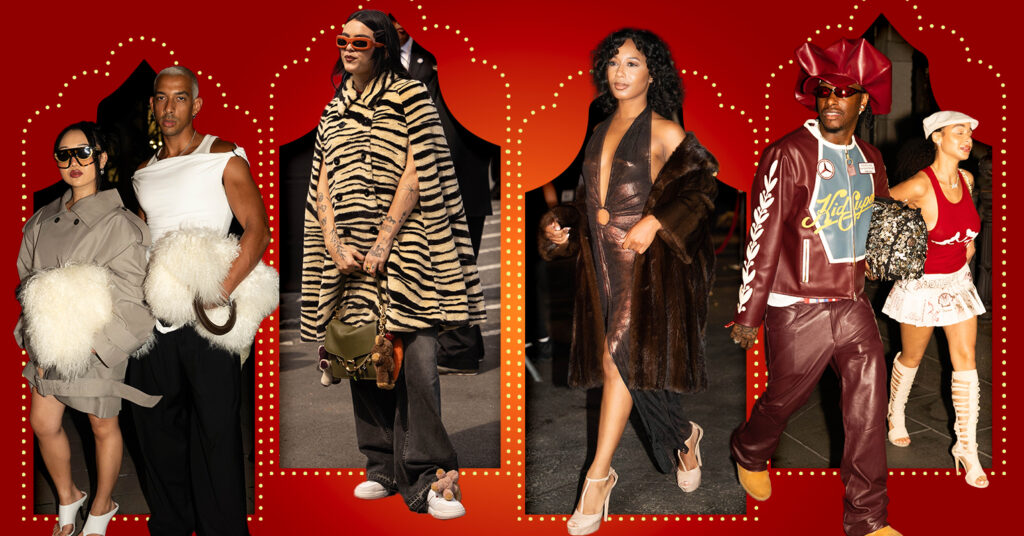In 2021, Elian Marjieh, known by her stage name Elyanna, rose to fame with her covers of classic Arabic songs. Since then, Elyanna has performed at various music festivals, sold out a tour, been featured on the front page of magazines, and released two albums. She engrains her identity and cultural cornerstones in every detail, from her outfits to music production. Following her performance at the Governors Ball this year, here are seven things we think you should know about Elyanna.
The Language of Music
Born and raised in the city of Nazareth, Elyanna was always very connected to her culture, namely through music. Artists renowned in Arab households, such as Dalida, Fairuz, and Umm Kalthum, would later go on to influence her singing style and lyricism. Being Palestinian Chilean, her exposure to music genres was always vast, spanning from Arabic music, to Western jazz and blues, and even Latin genres. Regarding the influences of Spanish music, Elyanna told Remezcla, “Every Christmas growing up, I would visit my big family in Vina Del Mar. Whenever I would go, I would hear reggaeton, which is super dancy, super sexy. Then, my [paternal] grandmother [had] good taste in music. So I would listen to classics like Julio Iglesias — I’m a big fan of Julio!”


Childhood Dreams to Reality
Elyanna’s earliest personal memory with music involved standing in front of her parents’ mirror and singing. Initially keeping her “performances” to herself, her family had to be secretive about watching her. With the encouragement of her brother, who she claims to have recognized her talent, she grew confidence in performing. Whether it be through competitions held in Nazareth, uploading covers on SoundCloud, or staying up until dawn to belt out notes with her dad, Elyanna began to sing everywhere she could. Her parents treasured and encouraged her dreams. As the years went on, her passion to become an artist grew so dramatically that her parents decided to move to the U.S. when Elyanna was only 15.
Family Bonds
It takes a village to raise not just a child, but also an artist. Elyanna’s success is both the outcome of her own efforts and the constant backing of her family and friends. Using her living room as her studio, Elyanna works in tandem with every one of her family members. Her lyricism has a history of three generations, with her grandfather and mother both known as published poets. Since childhood, her siblings have also always had nurturing roles in Elyanna’s creativity. Her brother, Feras, has been her creative director and now helps her produce her music, while her sister, Tali, takes on the role of stylist.
“Ta Ta” (Come on, come on)
In 2023, Elyanna became the first artist to perform her entire set in Arabic at Coachella, an accomplishment which has led to opportunities for other artists, such as Saint Levant this year, to do the same. Despite her current success, singing in Arabic was not in the singer’s original plans as an artist. As a fifteen year old living in San Diego, she was practicing singing in different styles in English, but none of them felt quite right. After countless singing lessons and trips to Los Angeles, Elyanna finally met her producer, Nasri, who would lay the foundation for her career.
“When I went to Nasri’s studio for the first time, he asked me to sing in Arabic, which wasn’t my plan, so I went home crying.” she told Vogue Arabia. “I spent the next sessions hating all the songs I sang, which included my first song, ‘Ana Lahale.’ Then, in one session, I sang ‘Ta Ta’ – a freestyle song, and that’s when I discovered that I loved it.”


Sounds of a Wedding
Palestinian culture and Arabic musical traditions are intricately woven through Elyanna’s discography. Although her lyrics and visual direction are heavily inspired by her upbringing in Palestine, her main source of inspiration is somewhat unexpected. “A lot of inspirations come from Palestinian weddings, which is random, but I love them.” she told The Cut. “The energy there is crazy. Like everyone’s just genuinely having fun. It’s heartwarming, honestly, because people are just really vibing. And the music is lit. In the studio with my brother, we would think of that, dabke, and the Arabic scents and even all these like instruments that they use, all these things that I really now use in my music.”
Eye for Style
Growing up playing with paper dress-up dolls, Elyanna admits she has always had an interest in fashion. She loved the aspect of freedom and creativity she could experience while customizing each cut-out. Currently, her styling is managed by her sister, Tali Marjieh. Amid hectic performance schedules, the sisters have admitted to making outfits in just one day. Dedicated to presenting the best form of Elyanna’s artistry in both appearance and technical performance, the two draw from their Palestinian roots. Elyanna can often be seen sporting coin sashes, gold jewelry, embroidery, and experimenting with combining different textures.
Elyanna’s eye for design has even led to a collaboration with PaliRoots, a Palestinian-owned clothing brand. A social media post details the passion behind the project: to raise awareness for the ongoing crisis in Gaza and reconnect those in the diaspora to their homeland. “Our collaboration is more than just music and art; it’s a tribute to the resilience of the human spirit, the enduring love for one’s roots, and the unbreakable bond between identity and home,” the image reads. “We hope to share our story and inspire others to embrace their heritage, no matter where life may lead them.”



Woledto
Released on the heels of her sold out self-titled tour, Elyanna’s recent album Woledto incorporates the intersection of Arab and Latin influences from the singer’s identity. Traditional instruments, such as the mijwiz and tablah, are combined with synthesized drum loops and bass drops to create a unique sound. Themes of longing and love are usually present, expressed with Elyanna’s warm vocal tone.
Unlike her previous releases thus far, Woledto has only one feature: her grandfather. On the track “Sad in Pali,” Elyanna sampled a snippet of her grandfather reciting poetry at a wedding. Inspired by a visit to Palestine, the lyrics convey the heart of adoration despite all the changes. By connecting references of Palestine’s olive trees and the innocence of a child, listeners can relate to Elyanna’s own bittersweet journey of leaving her homeland.
What’s Next?
Following the conclusion of a successfully sold out US tour, release of her new album, and television debut on The Late Show, what lies in the future for Elyanna? Branching out with cultural fusion from her Palestinian and Chilean roots, Elyanna looks forward to new challenges. Fans can expect to see more Latin influences in her music, as she hopes to be able to speak and sing more in Spanish.


Keep up with Elyanna on Instagram, X, and TikTok. You can listen to her music on YouTube, Spotify, and Apple Music.
Want more Elyanna? Read more about her performance at The Governors Ball here.




